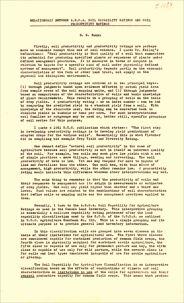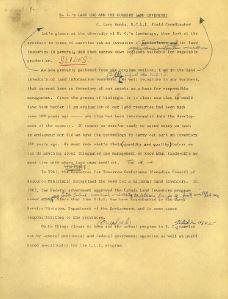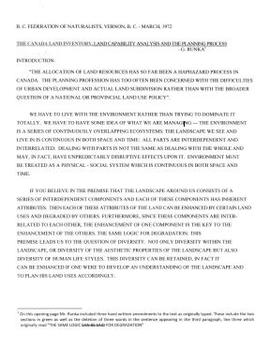File consists of a speech given by Gary Runka to the B.C.I.A. entitled "Agricultural Land Reserves and the Land Commission Act".
Commentary on this speech by Barry Smith of the Ministry of Agriculture and Lands:
"With the original package associated with this speech are 5 pages of rough notes for another speech with the same title prepared for a B.C.I.A. meeting on March 22, 1976... Given that these rough notes were held with the material associated with the April 15, 1976 meeting it is possible the B.C.I.A. meeting planned for March was shifted to the April date. Additionally there are 6 pages numbered 6-11 that are of some detail concerning the work of the Commission but appear to be part of another speech but are included with the B.C.I.A. package and have, therefore, been [included with this speech].
The title of the speech "Agricultural Land Reserves and the Land Commission Act" sums up the thrust of the speech which notes the objectives of the legislation, the Commission's program of land acquisition and Commission research and support of innovative projects to assist rural planning to create a positive environment for agriculture and give direction to urban growth away from farmland.
Additionally an overview is provided of the Commission's activities in its first two years of operation. GGR comments that establishing the ALRs "... was but a first step and we feel that it is our job to continue to protect the Reserve by whatever approaches and methods of rural planning that are available to us". This speaks to a Commission that saw its role, even at this early stage, as being much more than simply a rationing board reviewing ALR applications.
Several examples are outlined in which it is suggested that professional agrologists should be looking at carefully.
At the end of the speech (p.5) GGR includes (a note to himself) to "follow with example of an agrologist's public statement" that obviously was of concern. The actual public statement was not included with the speech given on April 15th but was included in the rough notes of the speech dated March 22 which read as follows:
"Yet a member of the B.C.I.A. - a P.Ag - is quoted in the press in response to a local politician who asked him a question something like this in regard to an ALR exclusion application:
Local politician: What about the international, national and local concerns regarding land for future food production?
BOA member P.Ag: We should firstly be concerned with places for people to live and secondly worry about land for food production.
This is our profession - the image is yours to make.
I don't mean that we should go overboard, but if we are not willing to defend preservation of agricultural land - who is?"


